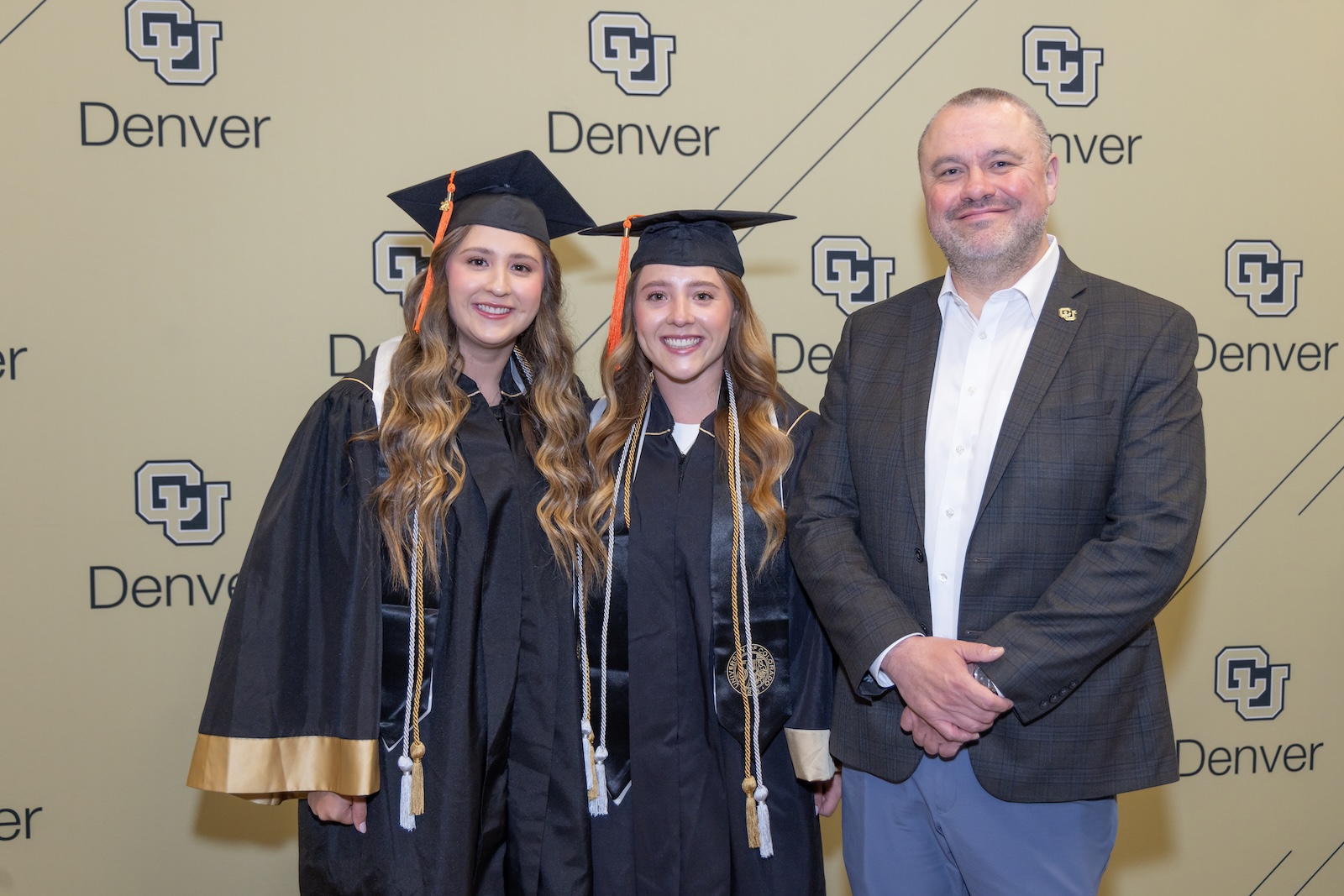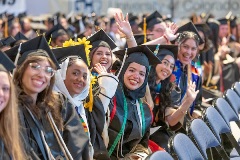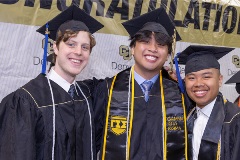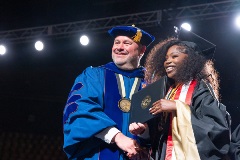Student Success and Elevating Opportunity
Jun 4, 2025
Dear Lynx community,
I want to begin by offering my most sincere sympathies for the victims, their families, and all those impacted by the senseless violence that took place in Boulder this week. We stand firmly in support of the Boulder community and firmly against violence of any form. I’ve found this attack particularly heartbreaking, including the unfortunate acknowledgment of the reality in which we exist. And yet I am heartened that in moments of suffering, there exists an opportunity to strive to embody our best selves—and this is what we see in the outpouring of love and generosity on behalf of the victims and the Boulder community. My hope is that our goodwill for one another is carried forward well beyond the response to this immediate event.
As we mourn the tragedy in Boulder, it was also just two weeks ago that we gathered in the Denver Coliseum to celebrate spring commencement.
It was inside the coliseum that I found myself struggling to put words to the energy I felt that day. Free of the pressures of their day-to-day academic and personal responsibilities, the culmination of our students’ life-changing achievement was on full display—through hugs, shrieks, laughter, and selfies. The unabashed release of joy felt electric. As I found myself conversing with our soon-to-be grads and joining them in their moments of revelry, I quickly realized that these would be the memories I would carry with me from the day’s events.
This included meeting with twin sisters Ashlynn and Deveyn Hainey (pictured below), who graduated with degrees in computer science from the College of Engineering, Design and Computing. As part of their senior capstone, under the guidance of Assistant Professor Zhengxiong Li, the duo developed PhishSense, a Gmail extension powered by large language models that helps users detect phishing attempts. The blend of academic mentorship and access to CU Denver’s experiential learning environment allowed the sisters to turn an idea into a prototype, one which they intend to continue developing while they also begin careers with two local engineering firms.




Although we didn’t have the opportunity to connect during commencement, I also want to congratulate a few other stellar grads from our 2025 class.
Hunter Gammel graduated with a degree in piano performance from the College of Arts & Media (CAM), doing so with limited use of his left hand due to cerebral palsy. Hunter was introduced to CU Denver through the LYNX National Arts & Media Camp, where he now serves as a tutor, creating pathways for future cohorts of CAM musicians to follow in his footsteps. In addition to his degree, Hunter earned honors as a 2025 CAM Outstanding Graduate and was named Resident Assistant of the Year at the Milo Awards.
Illustrating the impact CU Denver has made to reach students wherever they may be in their learning journey, degrees were conferred to graduates spanning nearly six decades of age, from Jose Carbon (75) to Faith Solter (18). Earning a master’s in history, Jose is a decorated military veteran who was born in Spain under the rule of Francisco Franco before immigrating to Cuba and later the U.S. Faith, who graduated Magna Cum Laude and was not even old enough to live on campus when she enrolled, will complete her master’s in sociology in 2026 through CU Denver’s 4+1 program. She plans to pursue law school.
Commitment to Elevate Student Opportunity
These stories, and many more like them, are what I have come to love most about our university. And yet, even while experiencing the jubilation of commencement, I could not help but to also reflect upon those students, who for whatever reason, did not join their peers in crossing the stage that day.
As was recently shared in a campus assessment completed by the National Institute for Student Success, a student who begins their college journey on our campus currently has a slightly less than 50% prospect of earning a degree from CU Denver. Although graduating every student is not realistic, we must strive to do more, both in service to our state, as well as our public service mission to elevate student opportunity.
The stakes for our students could not be higher, as a CU Denver degree not only changes the life of the graduate but also creates lasting change for their family and future generations thereafter. When considering Colorado public institutions, CU Denver stands alone at the intersection of accessibility and financial return.
When cross-referencing the Carnegie Student Access and Earnings Classification, which measures an institution’s accessibility within the geographic population it serves, and the annual Georgetown University Center on Education and the Workforce ROI data, CU Denver is the state’s lone public institution that is considered both highly accessible, while also producing graduates who average more than $2 million in lifetime earnings.
Recognizing this transformational value proposition, our responsibility to improve student outcomes is clear. When a student finds success at CU Denver, they reap the rewards.
Strategy to Improve Student Success
As we begin this work in earnest through our recently launched Student Success Transformation Initiative, I want to reiterate that this is not a dismantling of the past, but an amplification of the excellence that currently exists. I’m so very grateful for the work undertaken by prior campus administrations and I honor those students, faculty, and staff, who invested in previous student success initiatives.
Every student, no matter the college they enroll into, the major they select, or even the section of a course they register for, deserves an equal opportunity to persist, succeed, and graduate.
To implement this consistent standard of care, I want to spend a moment highlighting three areas I believe we can and should attack vigorously.
- Stop Out Rate (22% of all students)
- Transfer Rate (27% of all students)
- Major Change After Year Three (56% of all major changes; 14% of all students)
Our combined average stop out and transfer rate of nearly 50% is what has hit me hardest. These figures speak to a larger issue, that our students are too frequently wandering through coursework without a pathway that supports their success—a journey which, unfortunately, continues until they reach the point of departure or dismissal. Of our students who transfer, more than half leave for a different four-year institution, meaning they remain engaged toward earning their degree, but believe success exists elsewhere.
As it pertains to major selection, seeing so many students make a change after year three is alarming. This data points to the possibility that we do not understand how to holistically support nor expose our first-year students to the proper pre-college programming or introductory courses that align to successful major selection. This support is particularly critical for first-generation college students.
It's worth noting that these issues are not unique to CU Denver, but common across the country—among peer and non-peer institutions. I believe there is a method to reverse these trends as we have seen institutions like ours increase academic success and outcomes while also decreasing student debt. This was true during my time as provost at Illinois Tech, where our direct investment in student support resulted in a 30% increase in undergraduate application volume and enrollment growth that exceeded 35%.
The institutions which have shown consistent improvements have one major commonality: data. Like them, we too will invest time and energy to implement best practices on how we collect data, centralize it, analyze it predictively, and leverage it so that faculty and staff can best support students in need with immediacy. This could include everything from flagging course selection to degree progression to addressing small financial holds which impede registration and retention.
Done properly, we should reach a state where we can seamlessly service our students proactively, identifying and solving challenges before the student would otherwise encounter them.
As we look out toward the summer and into the fall term, I want to thank and acknowledge everyone who attended live or has since viewed the stream of our Student Success Town Hall (password $1#X%*%k). I also greatly appreciate all who volunteered their time to serve on one of the initial four working groups, whether as one of our eight co-facilitators or as a volunteer member.
These groups will commence in June, and each has been asked to develop actionable plans. Pilot programs are expected to launch in the spring, followed by campuswide implementation thereafter. My hope is that we come to see this period as a fork in the road and one where we will have advanced our public service mission with the communities we serve, while also reducing our structural budget deficit, bringing forth the prospectus of long-term financial stability.
The greatest impact will be with our students. They will be the ones who earn degrees more efficiently and in higher numbers, doing so with the skills to land quality employment.
I continue to believe our future is bright in meeting our public service commitment to Denver and Colorado—I would not be here advocating for change if I didn’t. I look forward to continued conversation and hope that everyone enjoys the first month of summer.

